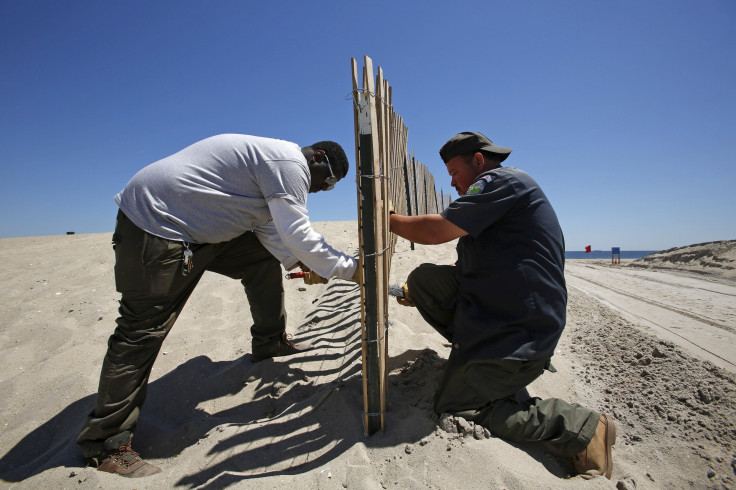Senate Investigation Into Sandy Fraud Claims Sparks Sharp Disagreement From New York Senator

Amid allegations of widespread fraud and an unprecedented review of nearly all Hurricane Sandy flood insurance claims, the U.S. Senate Banking Committee said Tuesday that its investigation has found no evidence to indicate that FEMA’s National Flood Insurance Program systematically robbed policyholders of money to repair their homes.
A trio of investigators studied FEMA's audit data from the federal program that partners with the insurance industry, one of the sectors that spends the most on Washington lobbying. Under the National Flood Insurance Program -- virtually the only source of flood coverage available to U.S. homeowners -- the government holds all of the underwriting risk, but it pays insurance companies to sell policies, and to handle and administer claims.
The Senate report, commissioned by the committee's Republican majority, detected no "systematic incentive" for companies to underpay homeowners, and found "no persuasive evidence" that insurers make a practice of doing so. "We found no net incentive to underpay," chief investigative counsel Christopher Ford told members of the U.S. Senate Committee on Banking, Housing, and Urban Affairs on Tuesday.
Homeowners in approximately 2,000 pending federal court cases say they were shortchanged after the 2012 storm, and Attorneys General in New York and New Jersey are conducting criminal investigations into alleged fraud. Ford testified that Senate investigators did not examine specific claims or allegations by individual homeowners, and said investigators could not rule out that fraud occurred in some cases.
He said it would be "surprising if no errors had occurred," given the magnitude of a storm that generated approximately 144,000 flood insurance claims. But the "most plausible explanation" for difficulties with claims, Ford said, "was simply that the storm's sheer scale overwhelmed the program's supply of good adjusters and engineers."
That explanation did not sit well with New York Democrat Sen. Charles Schumer. After citing "very troubling revelations" about a lack of oversight in the program, he criticized the fact that investigation relied on data provided by FEMA and insurers themselves.
"I particularly disagree with the view that there was not a systematic bias to underpayment," said Schumer. For months Schumer has worked closely with U.S. Senators from New York and New Jersey on efforts to reform the program, which has operated deeply in debt ever since Hurricane Katrina, and which is up for Congressional reauthorization in 2017.
The Senate investigation acknowledges that FEMA's "data has been very poorly kept," and it recommends improved recordkeeping on payment errors as "essential." Investigators also found the program's appeals process to be "deeply flawed," Ford said. Short of filing a federal lawsuit, the appeals process has been one of the few avenues open to homeowners who dispute their payout.
"Remarkably, FEMA does not even follow up" with insurers, Ford said, even if the agency agrees a policyholder might have been paid incorrectly.
While earlier this year FEMA confirmed the departure of two top program officials, the Senate report refers to official James Sadler as the "former head of the claims and appeals branch" for the flood insurance program. A FEMA spokesman would not answer questions from International Business Times about what role Sadler currently serves in, or about who currently serves as the head of claims. The agency said it "can't comment on personnel issues."
In a statement in response to the Senate report, the spokesman said: "We're going to continue moving forward to reform the National Flood Insurance Program regardless of whether underpayments were systemic or not...We agree with the Senate’s findings that managing the NFIP is a considerable challenge. We look forward to using the report’s findings to inform our ongoing work to make this program better."
FEMA assembled a nearly 100-person task force to improve the experience for policyholders, following highly-publicized allegations that engineers changed damage reports so that insurers could pay policyholders less.
Yet even as those internal reforms take shape, questions over whether the program somehow incentivizes insurers to lowball claims have loomed heavy in the background. Earlier this month, Brad Kieserman, the top official brought in to lead a turn-around at the NFIP -- and who has now left -- testified to Congress that FEMA's oversight of private companies is "wholly inadequate," and that more needed to be done to "follow the money" in the program.
The NFIP is dependent on layers and layers of private contractors to evaluate flood claims, and Kieserman testified that he had asked the Government Accountability Office (GAO) to conduct an audit of where the money goes. A spokesperson for the GAO confirmed to International Business Times that it has begun a "performance audit" of how the government works with insurance companies and their expenses. The GAO is currently determining the scope and methodology for conducting the audit, and the spokesperson said there is no time frame yet for when it will be completed.
Four FEMA officials were set to testify before the Senate committee on Wednesday, but that hearing is now postponed indefinitely. A spokeswoman for Sen. Richard Shelby (R-Alabama), the committee chairman, said that is to allow time to schedule an appearance by the head of the agency, administrator Craig Fugate.
Sen. Shelby said Tuesday that many questions about the NFIP remain unanswered. If 2,000 Sandy cases are still in court, he said, "that's too many, and something is wrong."
© Copyright IBTimes 2024. All rights reserved.











